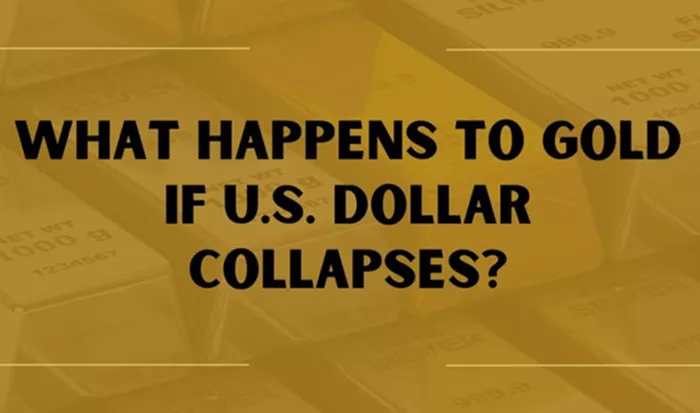If the dollar collapses, the implications for gold could be significant due to gold’s historical role as a store of value and hedge against currency devaluation. Here’s a detailed look at what might happen to gold in the event of a dollar collapse:
1. Increased Demand for Gold
Safety and Stability: When the dollar collapses, it often triggers a significant flight to safety among investors. Gold, due to its historical role as a store of value, becomes increasingly attractive as it is not tied to the performance of any single currency. In times of economic distress or geopolitical instability, gold’s intrinsic value and its status as a tangible asset make it a preferred choice for preserving wealth. This increased demand can drive up the price of gold as investors seek to safeguard their assets from the turmoil affecting fiat currencies.
Hedge Against Inflation: A collapsing dollar typically leads to high inflation or hyperinflation, where the currency rapidly loses purchasing power. Gold has historically served as an effective hedge against inflation, maintaining its value while fiat currencies diminish. As the dollar devalues, the real value of gold tends to rise, attracting investors looking to mitigate the impacts of inflation on their savings and investments.
2. Rising Gold Prices
Price Surge: As investors flock to gold during a dollar collapse, the surge in demand can lead to a substantial increase in gold prices. This is due to the basic economic principle of supply and demand; as more people and institutions buy gold to protect their wealth, the price rises. This phenomenon has been observed in past economic crises where gold prices spiked in response to financial instability and currency devaluation.
Market Sentiment: The collapse of the dollar can create widespread fear and uncertainty in financial markets. In such an environment, gold’s role as a safe haven becomes more pronounced. Market sentiment often shifts towards assets perceived as stable, such as gold, leading to increased buying activity. This heightened demand and positive sentiment can drive gold prices even higher, as investors seek to capitalize on its perceived security and potential for preserving wealth.
3. Gold as a Currency Alternative
Medium of Exchange: In scenarios where the dollar collapses severely, gold could potentially be used as an alternative medium of exchange. Historically, during periods of extreme currency devaluation or collapse, societies have reverted to using precious metals like gold for transactions. Although modern economies are less likely to revert fully to a gold-based system, gold could play a role in informal transactions or as a basis for new monetary systems.
Monetary Systems: The collapse of a major currency like the dollar might prompt discussions about returning to a gold standard or backing new currencies with gold. Such measures could restore confidence and stabilize the financial system. A gold standard, where the value of a currency is directly linked to a specific amount of gold, might be considered to provide a more stable and credible monetary foundation, though it comes with its own set of challenges and complexities.
See also: How High Will Gold Go In 2024?
4. Impact on Global Markets
Currency Depreciation: A dollar collapse would likely lead to depreciation in other currencies that are pegged to or heavily influenced by the dollar. This widespread currency devaluation could exacerbate global economic instability, further increasing the demand for gold as a stable asset. Countries with economies closely tied to the dollar would face additional pressure, leading to heightened interest in gold as a protective measure.
International Trade: The shift in currency values could alter international trade dynamics significantly. Nations with substantial gold reserves might experience relative currency strength compared to those with fewer reserves, potentially influencing global trade balances. Countries that hold large amounts of gold could leverage their reserves to stabilize their economies or negotiate better trade terms, impacting global trade flows and economic relationships.
5. Central Bank Actions
Gold Reserves: Central banks, as major holders of gold reserves, might increase their gold holdings to stabilize their own currencies and economies during a dollar collapse. The move to bolster gold reserves can be seen as a strategy to enhance national financial stability and restore confidence in the face of currency devaluation. This institutional buying can drive up gold prices further, reflecting the increased demand from central banks seeking to fortify their monetary positions.
Monetary Policy: In response to a collapsing dollar, central banks might engage in various monetary policies involving gold. This could include selling gold reserves to stabilize their currencies or engaging in gold-backed currency issuance. The scale and timing of such actions would impact gold markets, potentially leading to price volatility or shifts in gold’s role in global finance.
See also: How Much Is 999 Gold Worth?
6. Economic and Social Implications
Wealth Preservation: For individuals and institutions holding gold, a dollar collapse could result in substantial wealth preservation or even appreciation. Gold’s value relative to the dollar would likely rise, benefiting those with significant gold holdings. Conversely, individuals and entities reliant on the dollar for their assets could face severe financial hardship as their purchasing power declines rapidly.
Market Volatility: The transition from a collapsing dollar to a potentially new monetary system could introduce significant market volatility. Financial markets would likely experience upheaval as investors adjust to changing economic conditions. Gold, while providing stability to some, might also see price fluctuations due to its role as both a safe haven and a speculative asset in a turbulent financial environment.
Conclusion
The collapse of the dollar would likely lead to a surge in gold demand and prices due to its role as a safe haven and store of value. While gold offers a means to preserve wealth amidst currency devaluation, the broader economic impact would include significant volatility and shifts in financial dynamics. As with any major economic event, careful planning and diversification remain crucial for navigating potential challenges and opportunities.
Related Topics:

